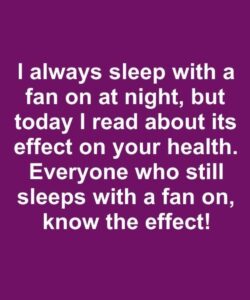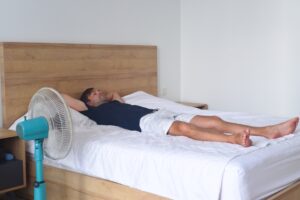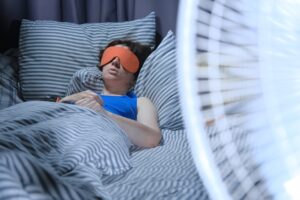What Happens When You Sleep with a Fan On? You Might Be Surprised

Let’s be honest—when it’s hot at night and you’re tossing and turning in sweaty sheets, a fan can feel like a lifesaver. In the UK, where air conditioning is a luxury most homes don’t have (less than 5% do), fans become essential when summer temperatures refuse to cool down.
But while that breeze feels amazing in the moment, sleeping with a fan on all night might not be as harmless as it seems. According to Dr. Naheed Ali, the soothing hum of an electric fan could come with some sneaky side effects you never expected.
1. Dryness That Wrecks Your Morning
You probably don’t notice it while you’re sleeping, but a fan running all night can dry out your mouth, throat, and nasal passages. The constant airflow draws moisture from your body, leaving you parched and hoarse when you wake up.

Ever wake up with a sore throat or stuffy nose, even though you’re not sick? That could be your fan slowly dehydrating your airways. And the thicker mucus that forms as a result? That’s what makes you feel all clogged up.
2. Dust Party, Anyone?
Fans don’t just move air—they stir up every little thing floating around in your room. That includes dust, pollen, pet dander, lint, and whatever else has settled into your carpets and curtains.
If you’ve got allergies or asthma, that cute little desk fan might be spreading a fine mist of misery straight into your lungs. One minute it’s cool air, the next minute you’re sneezing, coughing, or wondering why your chest feels tight.

3. Stiff Muscles, Achy Mornings
Pointing a fan directly at yourself while you sleep can cause muscles in your neck, shoulders, or back to tense up overnight. When your body is exposed to a steady stream of cold air, even while under the covers, it can react defensively—tightening muscles to keep warm.
That leads to stiffness and soreness, which you might mistake for “sleeping funny.” It’s not your pillow. It’s your fan.
4. How to Use a Fan Without Regret
Luckily, you don’t have to ditch your fan completely. If you’re not ready to suffer through a heatwave in silence, try these simple tricks:
-
Use a timer: Set the fan to turn off after an hour or two. This way, you fall asleep cool but aren’t exposed to a constant breeze all night.
-
Change the angle: Don’t blast your face. Point the fan at the wall or ceiling to bounce the airflow around the room more gently.
-
Hydrate like a pro: Drink water before bed and keep a bottle on your nightstand. Waking up dry-mouthed is the worst.
-
Clean your space: Dust your fan blades. Wash your bedding. Vacuum your floors. The less stuff floating in the air, the less you breathe in at night.

The Bottom Line
Sleeping with a fan on can be both a blessing and a curse. Yes, it’s an affordable, quick way to get some relief from summer heat—but it comes with a few caveats. Dry airways, stirred-up allergens, and sore muscles can turn your peaceful rest into a rough morning.
If you’re going to use a fan, be smart about it. Small changes can make a big difference, and your sinuses, lungs, and neck will thank you for it.